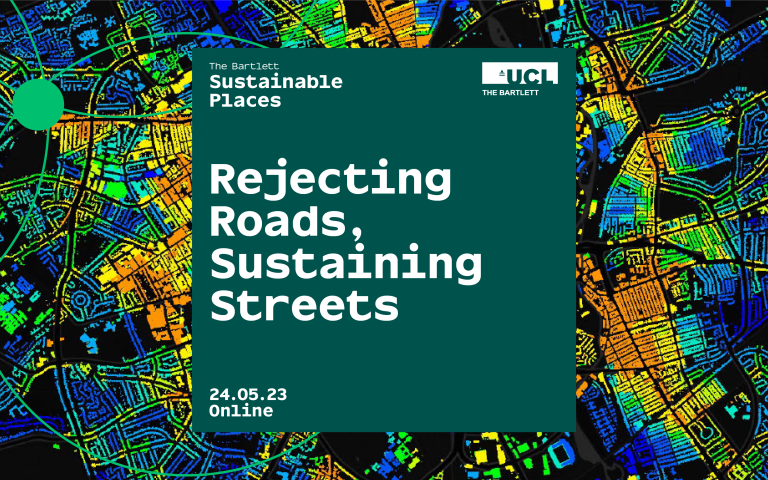Sustainable Places: Rejecting Roads, Sustaining Streets
24 May 2023, 1:00 pm–2:00 pm

This online Sustainable Places event will explore how real estate and urban design can contribute to health and sustainability, and why an integrated cross-sector approach to our buildings and cities is crucial.
This event is free.
Event Information
Open to
- All
Availability
- Yes
Cost
- Free
Organiser
-
Alma Daskalaki
About this event
This online Sustainable Places event will explore how our cities and built environments contribute to health, the climate crisis and sustainability, and why an integrated cross-sector approach to real estate and urban design is crucial.
The focus is often on carbon emissions during construction and use of buildings and structures, but broader impacts like biodiversity, social sustainability and governance extend beyond the building and real estate cycle, and are often under-considered.
In this event we’ll share new ideas demonstrating that a more integrated approach is needed between environmental, social and economic sustainability.
Using the example of the daily activity of walking, we’ll discuss how the built environment can make walking either possible or impossible, and in turn contribute to long-term health and the climate crisis.
We’ll explore integrated and interdisciplinary ways of creating sustainability through the geography of place, breaking down barriers between specialised industry segments and investment sectors.
We’ll discuss how ‘sustainable urbanism’ and ‘healthy urbanism’ can create integrated, wide-reaching change, and how the real estate industry can respond to these challenges and opportunities.
Recording and accessibility
The session will be recorded, and the recording and written transcript will be shared with attendees after the event.
We want to make our events accessible for everyone, and we encourage you to let us know if you have any accessibility requirements including:
- Presentation slides in advance for screen readers
- Live closed captions during the event
- Live British Sign Language interpretation during the event
- Any other requirements
Please contact Alma Daskalaki, Bartlett Faculty Events Officer at a.daskalaki@ucl.ac.uk with accessibility requirements. Please note we require two working days' notice for requests.
About the Speakers
Professor Yolande Barnes
Chair at The Bartlett Real Estate Institute, The Bartlett School of Sustainable Construction, University College London (UCL)
Yolande Barnes is Chair and Professor of Real Estate at The Bartlett Real Estate Institute within The Bartlett School of Sustainable Construction at University College London (UCL). She has been examining and analysing real estate markets since 1986. As Director of World Research at Savills, Yolande provided evidence-based advice to clients and thought-leadership in real estate. She set up and ran the UK residential research department, pioneering and developing new techniques for measuring place potential, land values and sustainable urbanism.
In 2012, she applied these techniques globally and in 2014 took on all sectors worldwide, focusing on cities. Yolande is an advisor to a variety of different enterprises and organisations. She writes regularly for research publications, national and international newspapers on a variety of property-related topics, and regularly appears on television and radio.
More about Professor Yolande BarnesEd Parham
Director of Innovation and Design at Space Syntax
Ed is an Architect (BA(hons) DipArch) and Director of Innovation and Design at Space Syntax.
His role combines the development of tools to analyse cities with their application to real-world projects. He has led international multi-disciplinary design teams to masterplan capital cities and shaped the development of digital tools to support evidence-informed decisions. The objective behind these activities is to create better cities for people by understanding how the built environment impacts on daily activities.
More about Ed Parham Close
Close

